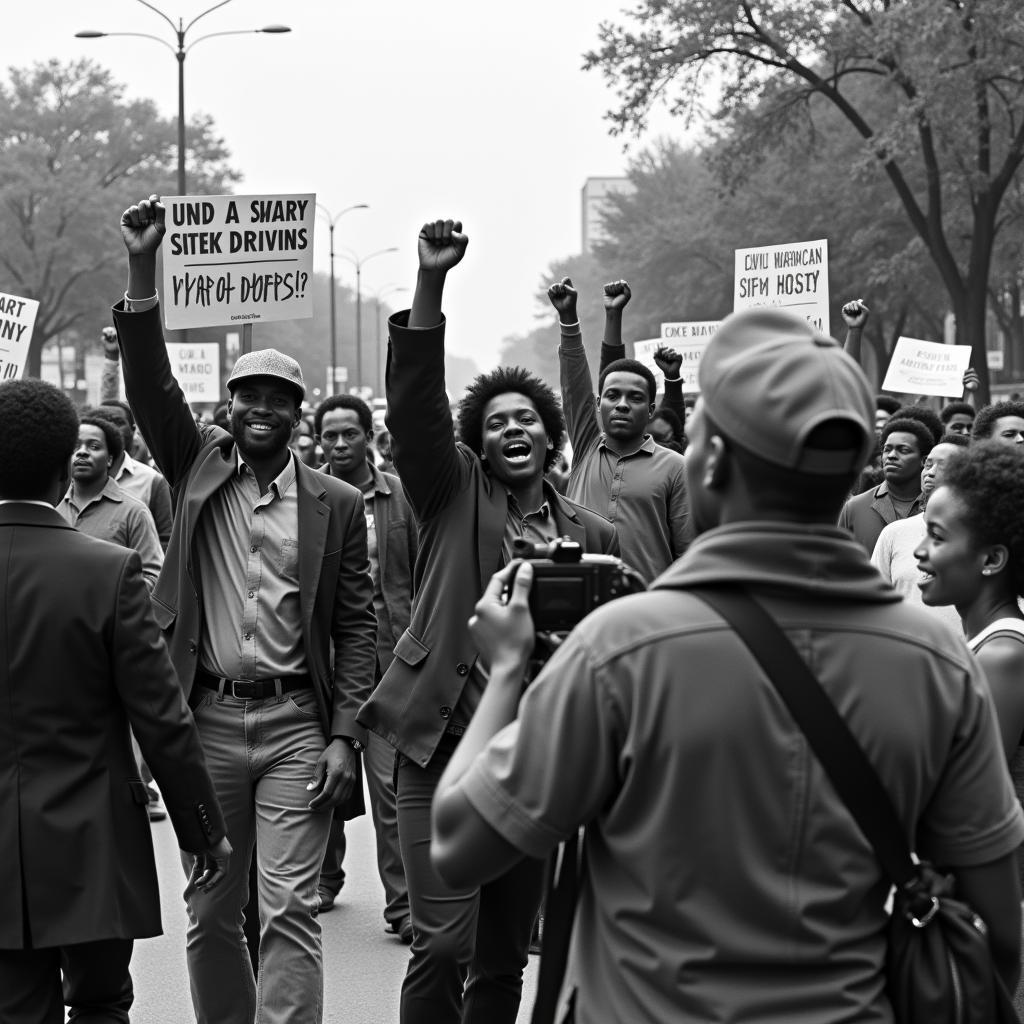The Evolution and Impact of African American Media
African American Media has played a pivotal role in shaping narratives, advocating for social justice, and showcasing the rich tapestry of Black experiences in America. From the early days of abolitionist newspapers to the rise of Black-owned television networks and the digital age’s expansive reach, the journey of African American media reflects a constant struggle for representation and a powerful voice for change.
 Early Black Newspapers – Documenting the Struggle for Freedom
Early Black Newspapers – Documenting the Struggle for Freedom
The Genesis of a Movement: Challenging Invisibility
The birth of African American media can be traced back to the early 19th century, fueled by the urgency to combat the pervasive misinformation and racist stereotypes propagated by mainstream white media. In 1827, “Freedom’s Journal,” the first Black-owned and operated newspaper in the United States, emerged as a beacon of truth and a platform for Black voices to challenge slavery and advocate for civil rights. This pioneering publication marked the beginning of a long tradition of Black press dedicated to exposing injustices, celebrating Black achievements, and fostering a sense of community.
Navigating Segregation and Amplifying the Civil Rights Movement
Throughout the tumultuous era of segregation, African American media outlets became vital lifelines for Black communities across the nation. Newspapers like “The Chicago Defender” and “The Pittsburgh Courier” played a crucial role in the Great Migration, providing information about job opportunities and safer living conditions in the North for African Americans fleeing the Jim Crow South. These publications served as powerful catalysts for social change, relentlessly exposing the brutalities of segregation and galvanizing support for the burgeoning Civil Rights Movement.
 African American Media and the Civil Rights Movement
African American Media and the Civil Rights Movement
The Rise of Black Television: Shaping Perceptions and Inspiring Generations
The latter half of the 20th century witnessed a transformative shift with the emergence of Black-owned television networks. Founded in 1980, the Black Entertainment Television (BET) network provided a much-needed platform for Black creatives and a space for Black audiences to see themselves represented in mainstream media. This groundbreaking network, along with the emergence of shows like “The Cosby Show” and “A Different World,” challenged stereotypes and showcased the diversity and richness of Black life in America.
african americans and the american media
Navigating the Digital Age: Expanding Reach and Amplifying Voices
The dawn of the digital age ushered in a new era for African American media, democratizing content creation and providing unprecedented opportunities for Black voices to reach global audiences. Online platforms have empowered independent Black creators, bloggers, podcasters, and journalists to bypass traditional gatekeepers and control their own narratives. Social media, in particular, has become a powerful tool for activism, sparking national conversations about racial injustice and police brutality, as seen with the rise of movements like Black Lives Matter.
Challenges and Opportunities: Towards a More Equitable Media Landscape
While African American media has made significant strides, challenges remain. The fight for equitable representation and ownership in the media landscape continues, as does the struggle against the persistent underrepresentation and misrepresentation of Black stories. The digital age, while offering new avenues for visibility, also presents challenges in combating the spread of misinformation and online hate speech.
african americans and the american news media, african american kid character
The Future of Representation: Authenticity, Inclusivity, and Innovation
The future of African American media hinges on continued innovation, a commitment to authentic storytelling, and an unwavering pursuit of inclusivity both in front of and behind the camera. As technology continues to evolve, so too will the ways in which Black stories are told and shared. The power of African American media lies not only in its ability to reflect the Black experience but also in its capacity to shape perceptions, inspire dialogue, and ultimately, contribute to a more just and equitable society.
 Black Media in the Digital Age: A Platform for Diverse Voices
Black Media in the Digital Age: A Platform for Diverse Voices
FAQ: Understanding African American Media
1. What is the significance of “Freedom’s Journal”?
“Freedom’s Journal” holds immense historical significance as the first Black-owned and operated newspaper in the United States, established in 1827. This pioneering publication provided a platform for Black voices to challenge slavery, advocate for civil rights, and combat racist stereotypes prevalent in mainstream media.
2. How did African American media contribute to the Civil Rights Movement?
African American media outlets played a crucial role in the Civil Rights Movement by relentlessly exposing the brutalities of segregation, galvanizing support for the movement, and disseminating vital information to Black communities. Publications like “The Chicago Defender” became instrumental in facilitating the Great Migration.
3. What impact did the establishment of BET have on television?
The founding of Black Entertainment Television (BET) in 1980 marked a pivotal moment in television history, providing a much-needed platform for Black creatives and a dedicated space for Black audiences to see themselves represented in mainstream media.
4. How has the digital age impacted African American media?
The digital age has democratized content creation, providing unprecedented opportunities for Black voices to reach global audiences and control their narratives. Online platforms and social media have become powerful tools for activism, amplifying conversations about racial justice and social change.
5. What are some of the challenges facing African American media today?
Despite significant progress, challenges remain in achieving equitable representation and ownership in the media landscape. Combating the spread of misinformation, addressing online hate speech, and ensuring the authentic portrayal of Black stories remain ongoing concerns.
Need More Information?
For further assistance or inquiries, please contact us at:
Phone: +255768904061
Email: [email protected]
Address: Mbarali DC Mawindi, Kangaga, Tanzania
Our dedicated customer support team is available 24/7 to assist you.